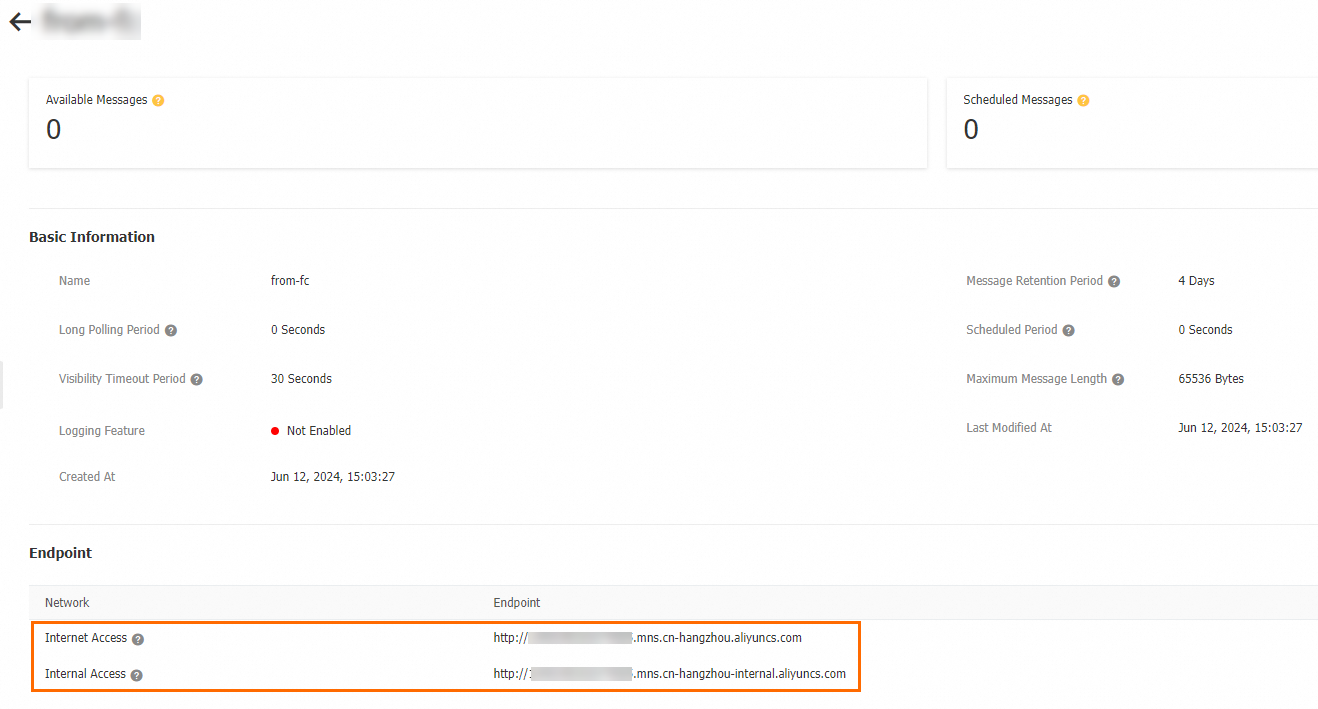This topic describes the versions and usage notes of the SDK for Go. This topic also provides sample code.
Instructions
After you download the SDK for Go of the latest version, decompress the package and go to the
aliyun-mns-go-sdkdirectory.Go to the
exampledirectory, and modify the endpoint that is used to access SMQ instances in thequeue_example.goortopic_example.gofile. Configure theALIBABA_CLOUD_ACCESS_KEY_IDandALIBABA_CLOUD_ACCESS_KEY_SECRETin the environment variable.For information about the endpoint, you can view the Endpoint of the Basic Information tab on the Queue Details/Topic Details page.

Sample code
Queue-based messaging model
The following sample code provides an example on how to create a queue, send messages, receive messages, delete messages, and delete a queue.
package main
import (
"fmt"
"log"
"net/http"
_ "net/http/pprof"
"time"
"github.com/aliyun/aliyun-mns-go-sdk"
"github.com/gogap/logs"
)
func main() {
go func() {
log.Println(http.ListenAndServe("localhost:8080", nil))
}()
// Replace with your own endpoint.
endpoint := "http://xxx.mns.cn-hangzhou.aliyuncs.com"
client := ali_mns.NewClient(endpoint)
msg := ali_mns.MessageSendRequest{
MessageBody: "hello <\"aliyun-mns-go-sdk\">",
DelaySeconds: 0,
Priority: 8}
queueManager := ali_mns.NewMNSQueueManager(client)
queueName := "test-queue"
err := queueManager.CreateQueue(queueName, 0, 65536, 345600, 30, 0, 3)
time.Sleep(time.Duration(2) * time.Second)
if err != nil && !ali_mns.ERR_MNS_QUEUE_ALREADY_EXIST_AND_HAVE_SAME_ATTR.IsEqual(err) {
fmt.Println(err)
return
}
queue := ali_mns.NewMNSQueue(queueName, client)
for i := 1; i < 10000; i++ {
ret, err := queue.SendMessage(msg)
go func() {
fmt.Println(queue.QPSMonitor().QPS())
}()
if err != nil {
fmt.Println(err)
} else {
logs.Pretty("response: ", ret)
}
endChan := make(chan int)
respChan := make(chan ali_mns.MessageReceiveResponse)
errChan := make(chan error)
go func() {
select {
case resp := <-respChan:
{
logs.Pretty("response: ", resp)
logs.Debug("change the visibility: ", resp.ReceiptHandle)
if ret, e := queue.ChangeMessageVisibility(resp.ReceiptHandle, 5); e != nil {
fmt.Println(e)
} else {
logs.Pretty("visibility changed", ret)
logs.Debug("delete it now: ", ret.ReceiptHandle)
if e := queue.DeleteMessage(ret.ReceiptHandle); e != nil {
fmt.Println(e)
}
endChan <- 1
}
}
case err := <-errChan:
{
fmt.Println(err)
endChan <- 1
}
}
}()
queue.ReceiveMessage(respChan, errChan, 30)
<-endChan
}
}Topic-based messaging model
The following sample code provides an example on how to create a queue, create a topic, subscribe to a topic, and publish messages.
package main
import (
"fmt"
"time"
"github.com/aliyun/aliyun-mns-go-sdk"
"github.com/gogap/logs"
)
func main() {
// Replace with your own endpoint.
endpoint := "http://xxx.mns.cn-hangzhou.aliyuncs.com"
queueName := "test-queue"
topicName := "test-topic"
queueSubName := "test-sub-queue"
httpSubName := "test-sub-http"
client := ali_mns.NewClient(endpoint)
// 1. create a queue for receiving pushed messages
queueManager := ali_mns.NewMNSQueueManager(client)
err := queueManager.CreateSimpleQueue(queueName)
if err != nil && !ali_mns.ERR_MNS_QUEUE_ALREADY_EXIST_AND_HAVE_SAME_ATTR.IsEqual(err) {
fmt.Println(err)
return
}
// 2. create the topic
topicManager := ali_mns.NewMNSTopicManager(client)
// topicManager.DeleteTopic("testTopic")
err = topicManager.CreateSimpleTopic(topicName)
if err != nil && !ali_mns.ERR_MNS_TOPIC_ALREADY_EXIST_AND_HAVE_SAME_ATTR.IsEqual(err) {
fmt.Println(err)
return
}
topic := ali_mns.NewMNSTopic(topicName, client)
// 3. subscribe to topic, the endpoint is queue
queueSub := ali_mns.MessageSubsribeRequest{
Endpoint: topic.GenerateQueueEndpoint(queueName),
NotifyContentFormat: ali_mns.SIMPLIFIED,
}
// 4. subscribe to topic, the endpoint is HTTP(S)
httpSub := ali_mns.MessageSubsribeRequest{
Endpoint: "http://www.baidu.com",
NotifyContentFormat: ali_mns.SIMPLIFIED,
}
err = topic.Subscribe(queueSubName, queueSub)
if err != nil && !ali_mns.ERR_MNS_SUBSCRIPTION_ALREADY_EXIST_AND_HAVE_SAME_ATTR.IsEqual(err) {
fmt.Println(err)
return
}
err = topic.Subscribe(httpSubName, httpSub)
if err != nil && !ali_mns.ERR_MNS_SUBSCRIPTION_ALREADY_EXIST_AND_HAVE_SAME_ATTR.IsEqual(err) {
fmt.Println(err)
return
}
/*
sub = ali_mns.MessageSubsribeRequest{
Endpoint: topic.GenerateMailEndpoint("a@b.com"),
NotifyContentFormat: ali_mns.SIMPLIFIED,
}
err = topic.Subscribe("SubscriptionNameB", sub)
if (err != nil && !ali_mns.ERR_MNS_SUBSCRIPTION_ALREADY_EXIST_AND_HAVE_SAME_ATTR.IsEqual(err)) {
fmt.Println(err)
return
}
*/
time.Sleep(time.Duration(2) * time.Second)
// 5. now publish message
msg := ali_mns.MessagePublishRequest{
MessageBody: "hello topic <\"aliyun-mns-go-sdk\">",
MessageAttributes: &ali_mns.MessageAttributes{
MailAttributes: &ali_mns.MailAttributes{
Subject: "AAA Chinese characters",
AccountName: "BBB",
},
},
}
_, err = topic.PublishMessage(msg)
if err != nil {
fmt.Println(err)
return
}
// 6. receive the message from queue
queue := ali_mns.NewMNSQueue(queueName, client)
endChan := make(chan int)
respChan := make(chan ali_mns.MessageReceiveResponse)
errChan := make(chan error)
go func() {
select {
case resp := <-respChan:
{
logs.Pretty("response: ", resp)
fmt.Println("change the visibility: ", resp.ReceiptHandle)
if ret, e := queue.ChangeMessageVisibility(resp.ReceiptHandle, 5); e != nil {
fmt.Println(e)
} else {
logs.Pretty("visibility changed", ret)
fmt.Println("delete it now: ", ret.ReceiptHandle)
if e := queue.DeleteMessage(ret.ReceiptHandle); e != nil {
fmt.Println(e)
}
endChan <- 1
}
}
case err := <-errChan:
{
fmt.Println(err)
endChan <- 1
}
}
}()
queue.ReceiveMessage(respChan, errChan, 30)
<-endChan
}Release notes
Version 1.0.11
Release date | Description | Download URL |
2025-03-20 |
|
Version 1.0.10
Release date | Description | Download URL |
2025-03-17 | The following issue is fixed: Region information check failed after you create endpoint resources suffixed with |
Version 1.0.9
Release date | Description | Download URL |
2025-03-11 | The version error issues#26 is fixed. This error is caused by inavaliable |
Version 1.0.8
Release date | Description | Download URL |
2025-02-06 | Supports configuring |
Version 1.0.7
Release date | Description | Download URL |
2025-01-23 |
|
Version 1.0.6
Release date | Description | Download URL |
2024-11-13 |
|
Version 1.0.5
Release date | Description | Download URL |
2024-08-19 | The earliest version of Go declared in the |
Version 1.0.4
Release date | Description | Download URL |
2024-07-17 |
|
Version 1.0.3
Release date | Description | Download URL |
2024-05-21 | You are allowed to set the transport attribute of the HTTP client. |
Version 1.0.2
Release date | Description | Download URL |
2021-03-05 | The OpenService operation is provided. |
Version 1.0.1
Release date | Description | Download URL |
2021-01-15 |
|
Version 1.0.0
Release date | Description | Download URL |
2019-04-30 |
|